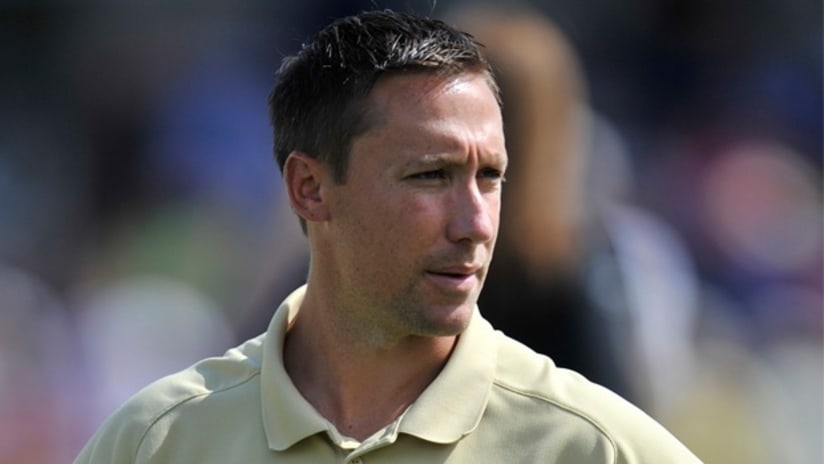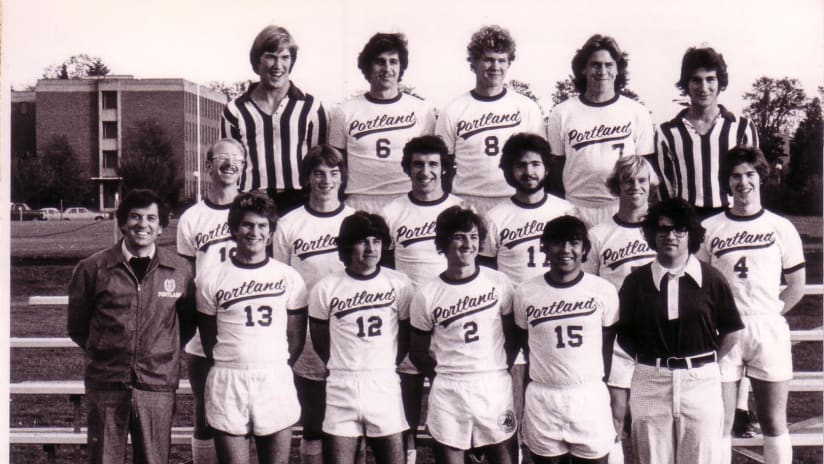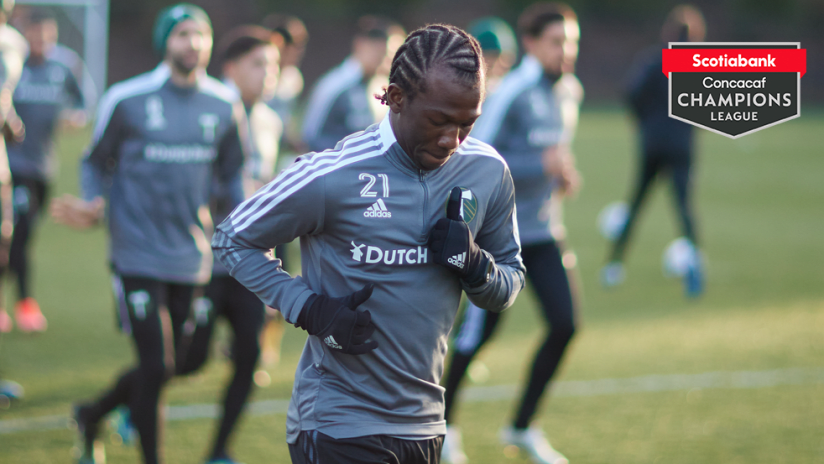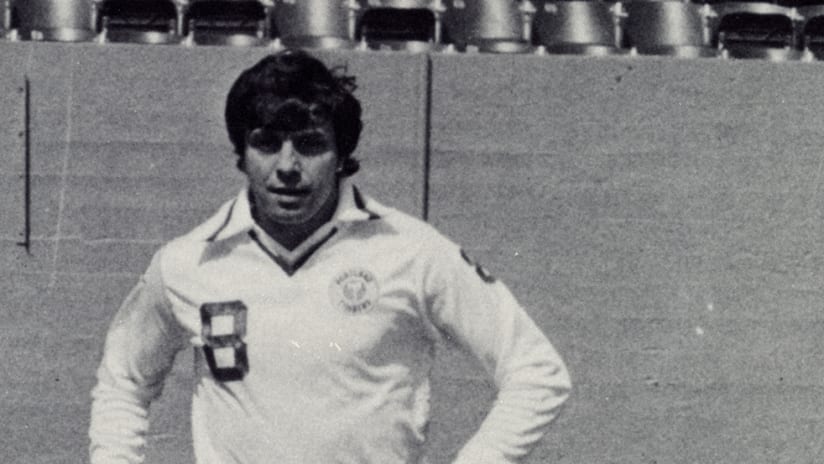Caleb Porter is finally in Portland. After being named the new Portland Timbers head coach in August, Porter remained at the University of Akron to fulfill a commitment to his players and finish out the 2012 collegiate season.
Despite the distance between Ohio and Oregon, Porter was never too far from his new team in Portland. While the Zips plowed through the Mid-America Conference, winning the regular-season championship, the MAC Tournament title and earning a #1 national ranking and fifth consecutive trip to the NCAA College Cup Round of 16, Porter was also in daily contact with Timbers general manager Gavin Wilkinson discussing strategies and players during the end of the 2012 season and into the MLS offseason.
Now in the Rose City, Porter will be introduced officially next Tuesday during a special news conference to be streamed live at www.portlandtimbers.com at 10:30 a.m. PT. In today’s first section of a special two-part interview, we discussed Porter’s challenges of balancing the myriad of responsibilities of finishing his time in Akron while preparing for Portland, his thoughts on coaching, and his preparations for the 2013 season. Monday’s Part Two will delve more into Porter’s decision to leave Akron for Portland, his experience leading the U.S. U-23s national team, and how he and his family are settling in Portland.
How did you balance the head coaching duties at Akron with preparations for the Timbers? Were you watching matches as the 2012 season came to a close? Making recommendations? What was that initial process like?
Caleb Porter: Certainly, during the season it was a bit of a juggling act as I felt it was important to follow through on my commitment to the Akron players, alumni and community while making sure that I slowly transitioned myself into my new role with the Timbers. During the season, I was in regular contact with Gavin Wilkinson and Merritt Paulson to create a dialogue and give input. However, I also didn't want to send mixed messages on my focus to Akron nor my involvement with Portland.
My priority at that point with the Timbers was to gain as much insight on the team as possible to have a better sense of things when I took over. I watched every match and had many conversations regarding my thoughts on the team. I was obviously not there every day to witness training, etc., but was getting feedback daily to start developing an opinion on what tweaks would need to be made in the offseason. I also felt it was important to start imprinting certain concepts on the players to help them prepare for the methodology we would be using next season. I was pleased to see progress in the team towards the end of the year, and I think this gives us something positive to build on for 2013.
Since the season at Akron ended, I have been 100 percent focused on the Timbers. I moved to Portland with my family on December 17th and for the past several weeks have been fully transitioning myself and family. I have been settling into the office, meeting with staff and speaking with players over the phone. We are in full swing preparing for the preseason and continuing to evolve our roster, etc. Meanwhile, off the field I have been looking for homes, schools for the kids and more. It’s a busy time but very exciting to know the season is only a few weeks away, and I feel like the transition has gone very smoothly.
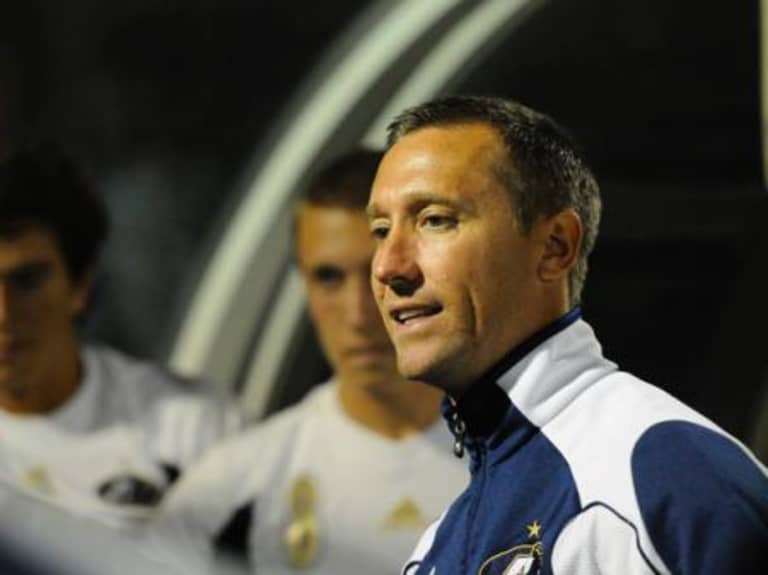
Photo via GoZips.com
What do you think will be your biggest challenge in adapting from the college game to MLS?
CP: I believe many of the things I have been doing in putting together teams for the past 13 years will be similar. But I have thought about this transition long and hard, and I am well aware of the challenges and that I will need to adapt some of my methodology from college to the professional game.
One of the challenges for any professional coach is managing the length of season. In college soccer the season is four months and in MLS the season is 10+ months. Developing a feel for that tempo and periodization of training will be critical. I will certainly rely on people around me to help, assistant coaches who have been through an MLS cycle and, of course, having a knowledgeable fitness coach will be very important. I have been studying pro teams for several years now and the game has become more and more scientific in order to maximize peak physical performance while minimizing injury. Having a pulse on the sport science helps with that guesswork, but another major component in addition to the physical periodization is the psychological aspect that needs to always be factored in as well.
It takes a lot of finesse to prepare your team to win games week after week while also making sure they are peaking at the right time tactically, physically and psychologically. All of these considerations are important and must be weighed every single day. At the same time, with such a long season, it will be very important to maintain a perspective on the big picture and for everyone to remain patient through difficult stretches. The management of all these things over a long season will be imperative to our success.
What kind of formation or style of play do you prefer? Better yet, what kind of strategy do you see the team employing in your first season and beyond?
CP: As far as system, I have always been very flexible and have adapted my teams depending on the personnel I have. I believe a system has to fit the players and their individual strengths/tendencies. In seven years at Akron I made changes to our system each year to highlight the group I had, and I will look to do the same with Portland.
At the same time there are certain formations I believe in more than others based on my philosophy to the game. I have worked primarily out of a 4-4-2 with a diamond midfield or 4-3-3, but certainly there are variations to each of these systems that I am able to make based on many different considerations. Ultimately, what formation we play will depend on the players we have and what fits best for our team at that point in time. System of play or the formation of the players is important, but for me the Style of play is more important to our overall blueprint in Portland—this is where a coach’s vision of the game shows through.
In MLS the successful teams have an Identity and the Portland Timbers will eventually have an Identity as well. For me, the most important thing that people should understand is that our philosophy regarding style of play is based on trying to increase our chances of winning games. I believe to consistently win in MLS we must move towards being a proactive and attack-oriented team that is looking to dictate games with possession and high-pressure defending. Ideally, we want to be the deciding team if possible. To decide the game you must have the ball and statistics show the more you have the ball the better chance you have to win. It will certainly take time to build towards controlling games this way and it will be important to look at our personnel and the team we are playing to be realistic with our approach. The bottom line—especially in the building stage—is we will do what we need to in order to give ourselves the best opportunity to win each game. Winning is the priority, plain and simple. But with time, I’m confident you will see a clear identity and brand of soccer with the Timbers that will be indicative of our philosophy to winning.
READ: Caleb Porter Q&A, Part Two: Timbers head coach has history in Pacific Northwest

